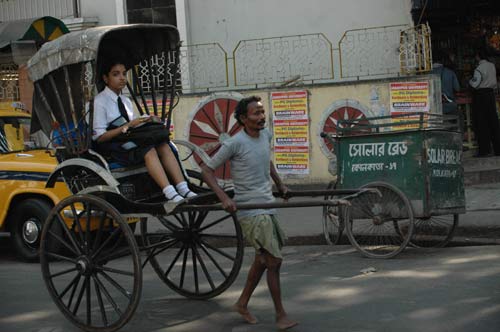SWEDISH SOUTH ASIAN STUDIES NETWORK
First Report from Kolkata 2005:
by Lars Eklund and Staffan Lindberg
Industrialisation under protest
 The
political climate seems calm today compared to earlier days. The state
of West Bengal is doing fairly well economically under the firmly established
Left Front regime, dominated by the Communist Party of India – Marxist,
CPI(M), with its current plans to re-industrialise the state after several
decades of capital’s flight for fear of communism and strong trade
unions. Now the situation is different, strikes are uncommon, foreign
investments are welcome and the IT sector is booming.
The
political climate seems calm today compared to earlier days. The state
of West Bengal is doing fairly well economically under the firmly established
Left Front regime, dominated by the Communist Party of India – Marxist,
CPI(M), with its current plans to re-industrialise the state after several
decades of capital’s flight for fear of communism and strong trade
unions. Now the situation is different, strikes are uncommon, foreign
investments are welcome and the IT sector is booming.
Still Frontline magazine, in its 18 November 2005 issue,
had an article about protests against plans by the Multinational Salim
Group of Indonesia to invest in what is called a ‘knowledge city’
south of Kolkata (read
the article). It was going to begin with a motorcycle manufacturing
unit in Howrah, on the western bank of the river Hooghly, but later on
the plans for the knowledge city also included a ‘health city’
for health tourists from abroad, research in the fields of biotechnology,
nanotechnology, biophysics and so on.
The protesters come both from the opposition party Trinamul Congres, led
by Mamata Baneerji, and from the ultra-leftist CPI-ML who have launched
demonstrations and built road-blocks to get their message out: land will
be taken from farmers and sold to foreigners. Though compensation would
be given to the farmers, this does not impress on the protesters, who
claim that West Bengal should continue to rely on its rich agriculture
for development, reminding of the utopias against industrialism fought
by the Luddites in England as well as the Narodnikies in Russia more than
hundred years ago. What is not mentioned though is the close connection
between the dictatorial Suharto regime and the Salim Group, which also
seem to be a strong motive of the protesters.
Commerce as the driving force in academic development
No such protests seem forthcoming, however, about the West Bengal government’s plans to set up a big biotechnology park at Calcutta University in collaboration with the city based firm Chem Gen Pharma to promote investment and research in this field. Similar projects are planned by the Indian Institute of Technology (IIT) in Kharagpur and by Kalyani University, both institutions close to Kolkata. The parks will be open for investments by private firms, have world class laboratories and aim at attracting scholars also from abroad. To us this is but one of many evidences of India’s quick ascendancy to world leading positions in science and technology and that too driven and funded by commercial forces. So is this the tune of the future for Indian academia? What can Swedish university based science offer, or maybe learn, under these circumstances? What of the future of the humanities and the social sciences then? Will it become all business and management oriented? Will there be a slow but steady starvation of history and culture oriented research? We have just about started our journey.
SASNET - Swedish South Asian Studies Network/Lund
University
Address: Scheelevägen 15 D, SE-223 70 Lund, Sweden
Phone: +46 46 222 73 40
Webmaster: Lars Eklund
Last updated
2006-02-22
